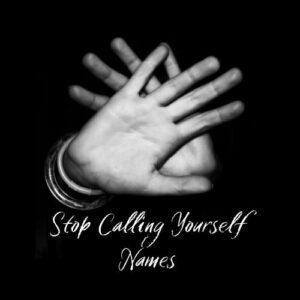Do you believe what you think makes you a good or bad person?
I think this is a fascinating topic and one worth a deeper dive.
I invite you to consider the possibility that thoughts don’t inherently have moral value.
But before going on, let’s clarify a baseline understanding of where thoughts come from.
Let’s start with the assumption that humans are both a social and conditioned species. In other words, we don’t self-construct thoughts and as children our consciousness is highly suggestible and our brain is constantly seeking and integrating new information in the form of thoughts (ie sentences in our mind) . Based on my experience, training and understanding, our thoughts about ourselves, others and the world don’t come from one source; instead, our they are a compilation of myriad variables including, but not limited to:
- society at large
- social and other media sources
- shared environment with caregivers, siblings, peers
- personal observations and experiences
- educational systems
- genetic predisposition
- temperament
Something else interesting here is that much of the research to date posits that somewhere between 80-95% of what we think is out of our awareness, essentially running off a conditioned automation system.
So if we are conditioned beings who generate thoughts based on what we’ve absorbed from varied influences and experiences, most of which are not even conscious, then perhaps our thoughts do not make us good or bad people.
To take this a step further, let’s examine the effect of believing thoughts are moral.
When you believe the sentences in your mind determines your goodness or badness, you will not want to look at those sentences. Because half of what you will find are “bad” sentences. This is because humans are not binary; we are a reflection of the nature of the world, which means we love and hate just as we protect and destroy. But if we don’t accept our own humanity, we will be afraid to see the whole picture of who we are. So when we get glimpses of our judgments or biases or negative thinking, we feel shame and guilt about our own thoughts and we train ourselves not to look.
If you believe you’re a good person because you have “morally good” thoughts, you’re going to be very vigilant about only having “good” thoughts and fearful of having “bad” thoughts. This is like holding a beach ball under water and eventually it will breach the surface. It is times like these we get defensive and angry and seek to suppress and deny these thoughts because you think they mean something about you.
What if your thoughts don’t mean anything about you?
What if they’re just echoes of your conditioning?
What if you’re just human; a perfect mix of good and bad?
What your thoughts don’t have moral value?
What if what you believe doesn’t make you a good or bad person?
Your thoughts are what generates your emotions.
Your emotions are what fuel your actions.
Your actions are what create your results.
If you want to change what you’re doing, how you’re feeling or the results you’re getting in your life, you have to change what you’re thinking.
But you can’t change what you’re thinking if you’re afraid of looking at your thoughts.
If you believe there are good and bad thoughts that make you a good or bad person, you’ll block your own growth because you’ll be too afraid to look at your thoughts. Instead, you’ll make sure you keep thinking the same thoughts even if they don’t serve you and stunt your own emotions. The result is that you cut yourself off from your own humanity and curate a self that ensures you keep the good person box always checked off at the expense of your own emotional health.
The antidote is to start by accepting that human brains generate the whole range of thoughts; good, bad, right, wrong, loving, hateful, rejecting, judgmental, accepting and rejecting. These thoughts don’t condemn us as evil or esteem us as angelic. Thoughts are just interpretations in the form of sentences translated by the brain based on a wide range factors. Once we accept this premise, we give ourselves permission to see what we’re thinking with curiosity and compassion. Having this awareness allows us the freedom to choose what sentences we want to keep, edit or delete.



